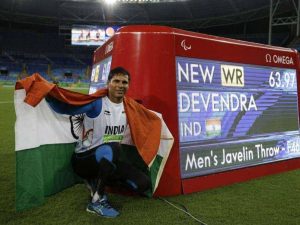In November last year, javelin thrower Devendra Jhajharia told News18 “Rio is the only thing in my mind… I want to kiss the gold medal again and hoist the tri-colour on Rio soil. I want to create history again.” On September 13, at the Engheno Olympic stadium in Rio, he did just that.
In his third attempt in the men’s F46 event, he threw the javelin to 63.97 metres, bagging a gold medal and breaking his own record of 62.15 metres set during the 2004 Paralympics in Athens.

Source: Twitter
Devendra, who comes from a village in the Churu district of Rajasthan, was eight when he climbed up a tree while playing with his friends. He was not aware that there was an 11,000 volt live wire tangled among the branches. He was electrocuted when his left hand touched the wire. The doctors had no option but to amputate his arm and his life was never the same.
People would often remark with predictable pity that he will never be able to do anything with his life. But under the nurturing care of his parents, Devendra didn’t let his disability come in the way of his dreams.
“One day, I was sitting in the school playground when I saw a boy throwing a javelin. I asked myself – Devendra, can you do this? I rushed to that boy and requested him if I can also try to throw it once. He agreed. And, I threw the javelin for a longer distance than that boy was throwing,” he told News18.
In rural Rajasthan, young Devendra fashioned a javelin out of whatever he could get his hands on — a bamboo stick or a fisherman’s harpoon, and he started practicing without informing anyone. He knew he wouldn’t be able to convince his parents and anyone who heard about it would make fun of him. Devendra wanted to prove to the world that he was no weakling; that despite his handicap he could still be a champion.
He soon got the knack of the sport and started participating in school and district level competitions where he won several laurels.
Source: Twitter
Coach Ripudaman Singh identified his talent in 1997 after seeing him in a school tournament. He quickly moved up the rankings and won his first gold medal at the Far East and South Pacific Games for the Disabled in Korea in 2002. The flag bearer of this year’s contingent at the Paralympics, Devendra has in the past been awarded the Padma Shri and the Arjuna Award. Currently ranked number three in the world, his win has taken India’s medal tally up to four with one bronze, one silver and two gold medals.
Know more about the Rio 2016 Paralympic Games, here.
Like this story? Or have something to share? Write to us: contact@thebetterindia.com, or connect with us on Facebook and Twitter (@thebetterindia).
If you found our stories insightful, informative, or even just enjoyable, we invite you to consider making a voluntary payment to support the work we do at The Better India. Your contribution helps us continue producing quality content that educates, inspires, and drives positive change.
Choose one of the payment options below for your contribution-
By paying for the stories you value, you directly contribute to sustaining our efforts focused on making a difference in the world. Together, let's ensure that impactful stories continue to be told and shared, enriching lives and communities alike.
Thank you for your support. Here are some frequently asked questions you might find helpful to know why you are contributing?

